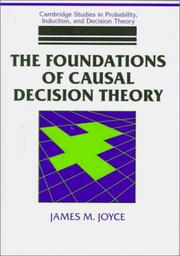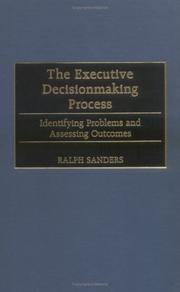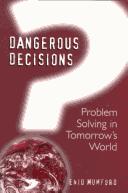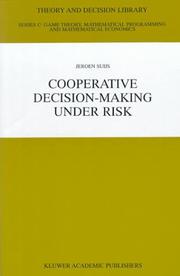| Listing 1 - 5 of 5 |
Sort by
|

ISBN: 0312225296 0312225210 9780312225292 9780312225216 Year: 1999 Publisher: New York: Palgrave,
Abstract | Keywords | Export | Availability | Bookmark
 Loading...
Loading...Choose an application
- Reference Manager
- EndNote
- RefWorks (Direct export to RefWorks)
European Union --- Decision making --- Union européenne --- Decision, prise de

ISBN: 0521641640 0521063566 1107173108 9786611383879 0511398093 0511398921 0511498497 1281383872 0511396597 0511401043 0511397321 9780521063562 9780521641647 9780511397325 9780511401046 9780511498497 Year: 1999 Volume: *4 Publisher: Cambridge New York Cambridge University Press
Abstract | Keywords | Export | Availability | Bookmark
 Loading...
Loading...Choose an application
- Reference Manager
- EndNote
- RefWorks (Direct export to RefWorks)
This book defends the view that any adequate account of rational decision making must take a decision maker's beliefs about causal relations into account. The early chapters of the book introduce the non-specialist to the rudiments of expected utility theory. The major technical advance offered by the book is a 'representation theorem' that shows that both causal decision theory and its main rival, Richard Jeffrey's logic of decision, are both instances of a more general conditional decision theory. The book solves a long-standing problem for Jeffrey's theory by showing for the first time how to obtain a unique utility and probability representation for preferences and judgements of comparative likelihood. The book also contains a major new discussion of what it means to suppose that some event occurs or that some proposition is true. The most complete and robust defence of causal decision theory available.
Decision making. --- Besluitvorming --- Besluitvormingsanalyse --- Besluitvormingsprocessen --- Deciding --- Decision analysis --- Decision making --- Decision processes --- Decision-making --- Décision [Prise de ] --- Décision [Théorie de la ] --- Making decisions --- Management decisions --- Management--Beslissingen --- Management--Besluitvorming --- Management--Decision making --- Prise de décision --- Théorie de la décision --- Prise de décision --- Arts and Humanities --- Philosophy --- Choice (Psychology)

ISBN: 1567202934 0313004439 0585383820 9780585383828 9781567202939 9780313004438 Year: 1999 Publisher: Westport, Conn. Quorum
Abstract | Keywords | Export | Availability | Bookmark
 Loading...
Loading...Choose an application
- Reference Manager
- EndNote
- RefWorks (Direct export to RefWorks)
Decision making. --- Problem solving. --- Management --- Executives. --- Prise de décision --- Résolution de problème --- Gestion --- Cadres (Personnel) --- Décision, Prise de --- Management Theory --- Business & Economics --- Prise de décision --- Résolution de problème --- Décision, Prise de --- Deciding --- Decision (Psychology) --- Decision analysis --- Decision processes --- Making decisions --- Management decisions --- Business executives --- Company officers --- Corporate officers --- Corporation executives --- Managers --- Decision making --- Methodology --- Psychology --- Executive functions (Neuropsychology) --- Choice (Psychology) --- Problem solving

ISBN: 0306461439 Year: 1999 Publisher: New York Dordrecht Kluwer Academic Plenum publishers
Abstract | Keywords | Export | Availability | Bookmark
 Loading...
Loading...Choose an application
- Reference Manager
- EndNote
- RefWorks (Direct export to RefWorks)
Besluitvorming --- Besluitvormingsanalyse --- Besluitvormingsprocessen --- Crime [Prévention du ] --- Crime prevention --- Crime--Prevention --- Crimes--Prévention --- Deciding --- Decision analysis --- Decision making --- Decision processes --- Decision-making --- Décision [Prise de ] --- Décision [Théorie de la ] --- Délinquance--Prévention --- Informatiemaatschappij --- Information society --- Informationsgesellschaft --- Making decisions --- Management decisions --- Management--Beslissingen --- Management--Besluitvorming --- Management--Decision making --- Misdaadpreventie --- Misdaden--Preventie --- Prevention of crime --- Prise de décision --- Probleemoplossen --- Problem solving --- Prévention de la criminalité --- Prévention de la délinquance --- Prévention du crime --- Sociedade da informação --- Société de l'information --- Société de la connaissance --- Société du savoir --- Solution de problèmes --- Théorie de la décision --- Crime prevention. --- Decision making. --- Information society. --- Problem solving.

ISBN: 0792386604 1461370973 1461546370 9780792386605 Year: 1999 Volume: 24 Publisher: Boston: Kluwer,
Abstract | Keywords | Export | Availability | Bookmark
 Loading...
Loading...Choose an application
- Reference Manager
- EndNote
- RefWorks (Direct export to RefWorks)
In cooperative games, one generally assumes that the agents know exactly the joint (monetary) gains that can be achieved by any possible coalition of cooperating agents. In reality, however, only little is known with certainty. This does not necessarily imply that traditional cooperative game theory cannot be applied in practical situations, for in various cases knowledge of the expected gains suffices. In many other cases, however, it is just the sharing of risk that is beneficial. Joint ventures, for instance, exist since cooperation reduces the risk of the investment for the individual parties. Since the existing models fail to incorporate such risks, they are not suitable for analyzing cooperative decision-making under risk. This book aims to rectify this deficiency by discussing a model of cooperative games with random payoffs.
Besluitvorming --- Besluitvormingsanalyse --- Besluitvormingsprocessen --- Deciding --- Decision analysis --- Decision making --- Decision processes --- Decision-making --- Décision [Prise de ] --- Décision [Théorie de la ] --- Making decisions --- Management decisions --- Management--Beslissingen --- Management--Besluitvorming --- Management--Decision making --- Prise de décision --- Risico --- Risk --- Risque --- Théorie de la décision --- Economic theory. --- Operations research. --- Decision making. --- Finance. --- Economic Theory/Quantitative Economics/Mathematical Methods. --- Operations Research/Decision Theory. --- Finance, general. --- Funding --- Funds --- Economics --- Currency question --- Decision (Psychology) --- Management --- Choice (Psychology) --- Problem solving --- Operational analysis --- Operational research --- Industrial engineering --- Management science --- Research --- System theory --- Economic theory --- Political economy --- Social sciences --- Economic man
| Listing 1 - 5 of 5 |
Sort by
|

 Search
Search Feedback
Feedback About UniCat
About UniCat  Help
Help News
News